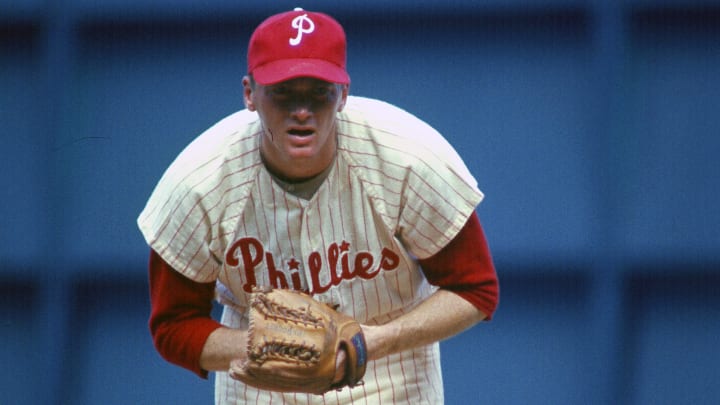Jim Bunning: Vexing senator, underappreciated Hall of Famer—but the only man to do both

Jim Bunning of Kentucky died on Friday at 85, seven months after suffering a stroke, six years after departing the U.S. Senate, and 45-plus years after he finished a pro baseball career that would land him in the Hall of Fame in 1996. The former Phillie, Tiger, Pirate, and Dodger is the only man ever to make it into Cooperstown and the upper chamber. What a pitcher Bunning was: The six-foot-three righty won 224 games, struck out 2,855 batters (second-most in history on the occasion of Bunning's retirement), and made the all-star team nine times.
He needed the support of the veterans committee to make the Hall, and he never won a Cy Young, but he deserved one in 1967, when he threw 300-plus innings of 2.29 ERA ball for the Philadelphia Phillies and led the league in strikeouts. Win-loss record was everything back then, and Bunning's 17-15 figure for a fifth-place club did not wow the voters. He lost five games by the score of 1-0. Advanced stats now tell us too that in 1960 Bunning was the best pitcher in the American League. His record, though, was 11-14.
Fame Game: A dozen Cooperstown-bound stars and the most star-studded matchup ever
There is a good overall case, in fact, that Bunning was the sort of pitcher who would have been better appreciated in an era other than the one he played in. He was a sidearmer who threw almost as many sliders as he did fastballs, all of which drove the Tigers, his first employer, batty. (He debuted in Detroit's system in 1950 but did not become a full-time major leaguer until 1957. Part of the problem was that the Tigers tried to make him throw overhand; part of the problem was that he hadn't yet mastered that slider.) His off-the-field conduct didn't endear him to management, either. An economics major in college, he was a tough negotiator on his own contracts and served as the Tigers' union rep. These days, that sort of thing might get a player praise, but back then it got a player run out of town, which is how Bunning wound up dealt to the Phillies in 1964. (Incidentally, he was nicknamed "the Lizard" when he played. There is some dispute over why, but there is no dispute that it was not a compliment.)
That year, Bunning threw a perfect game at Shea Stadium and became the first National Leaguer to do so in the 20th century. On September 20, 1964, his record stood at 18-5, and the Phillies had a six-and-a-half-game lead in the National League. In one of the worst collapses in baseball history, they would lose the next 10 games in a row and blow their shot at their first-ever championship. Bunning started three of those games.
Had the '64 Phillies, instead of the Cardinals, gone on to the World Series, and had they, instead of the Cardinals, beaten the Yankees, perhaps Bunning would have been a Philadelphia legend, earning the status he was denied in Detroit. Instead, he was tossed overboard after his stellar '67 as part of a Phillies rebuild.
Revisiting and re-ranking baseball's top 10 prospect lists 10 years later
The indignity continued after his retirement in '71: Bunning spent five years managing in the Phillies' system, making it all the way to Triple-A before being fired at the behest of Dallas Green, the farm director and Bunning's close friend. (Green, who died in March of this year, would in 1980 manage the Phillies to that first title.) He had little choice but to head back home to Fort Owens, Ky., and try to make it as a player agent. From there, he landed a seat on the city council and later in the state senate. In 1986, after a failed gubernatorial bid three years prior, he won election to Congress from Kentucky's Fourth District. He was a reliable hard-line member of the Republican caucus as the party rose to congressional power. (How he landed on those politics, given his union-activist days in baseball, is something of a mystery.) Twelve years later, he took his seat in the Senate.
If Bunning the pitcher was a great who never quite got his due, Bunning the senator was close to the opposite. He struggled and was hounded for it. In 2006, TIME branded him one of America's five worst senators, saying that "he shows little interest in policy unless it involves baseball." He was a crank given to odd votes and outbursts—in 2010, he unsuccessfully filibustered an extension of unemployment benefits, and in 2009, he suggested that Supreme Court justice Ruth Bader Ginsburg would be dead within nine months. In 2004, he said his Democratic opponent looked like one of Saddam Hussein's sons. That November, George W. Bush carried the state by 20 points. Bunning won by just one. (He apologized for both remarks.)
Is Austin Romine the answer to Masahiro Tanaka's early-season struggles?
Toward the end of his second term in the Senate, he began missing a substantial number of votes—he was the only senator not to vote on the Affordable Care Act—and despite an incredibly favorable national climate for Republican candidates in 2010, Bunning's Senate colleagues steered him away from running for a third one. Sen. Rand Paul, who had never before run for office, would hold Bunning's seat by 11 points that November.
Even Bunning would acknowledge that a feud with his colleagues was a characteristic way for him to depart Washington. In his farewell address to the Senate, attempting to connect his disparate careers, he said, "I have been booed by 60,000 fans in Yankee Stadium standing alone on the mound, so I have never really cared if I stood alone here in the Congress, so long as I stood by my beliefs and my values."
